As the days grow warmer and the sun lingers a little longer in the sky, my kitchen beckons me to create fresh, vibrant dishes that celebrate the arrival of spring. One recipe that never fails to capture the essence of the season is a delightful Asparagus Salad. Crisp, tender asparagus spears, paired with an array of complementary flavors and textures, evoke feelings of excitement and anticipation for the bountiful produce that lies ahead. As a passionate food enthusiast and lover of seasonal ingredients, I find myself drawn to this recipe for its simplicity and versatility. With each bite, I’m transported to a sun-drenched garden bursting with the vibrant colors and flavors of springtime. Join me on this culinary journey as we embrace the joys of the season and indulge in the fresh, wholesome goodness of an Asparagus Salad.

Asparagus Salad Recipes
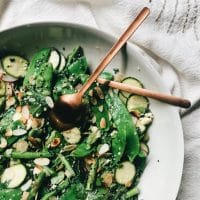
Asparagus Salad With Feta And Almonds
Equipment
Ingredients
- 2 bunches asparagus spears thick, approx. 2 lbs
- Zest of 1/2 lemon
- 2 tablespoons lemon juice
- 2 tablespoons white wine vinegar
- 2 teaspoons shallot minced
- sea salt and black pepper to taste
- 1/3 cup extra virgin olive oil
- 1/4 almonds chopped roasted
- 1/2 cup feta cheese diced
Instructions
- On a hot grill, place 12 asparagus spears and cook, turning often, until tender.
- To make the vinaigrette, combine the lemon juice and zest, the white wine vinegar, the shallot as well as the salt and pepper. Add the olive oil and adjust the seasoning to taste.
- With a vegetable peeler, slice the remaining asparagus into long strips and place in a large bowl. Add the feta and almonds. Toss with the vinaigrette.
- To serve this dish, place the asparagus ribbons on a salad plate, top with grilled asparagus spears and extra vinaigrette.
Video
Notes
Nutrition
© Food And Meal
This website provides approximate nutrition information for convenience and as a courtesy only. Nutrition data is gathered primarily from the Spoonacular Database, whenever available, or otherwise other online calculators.
Alternative Method: Grilled Asparagus Salad
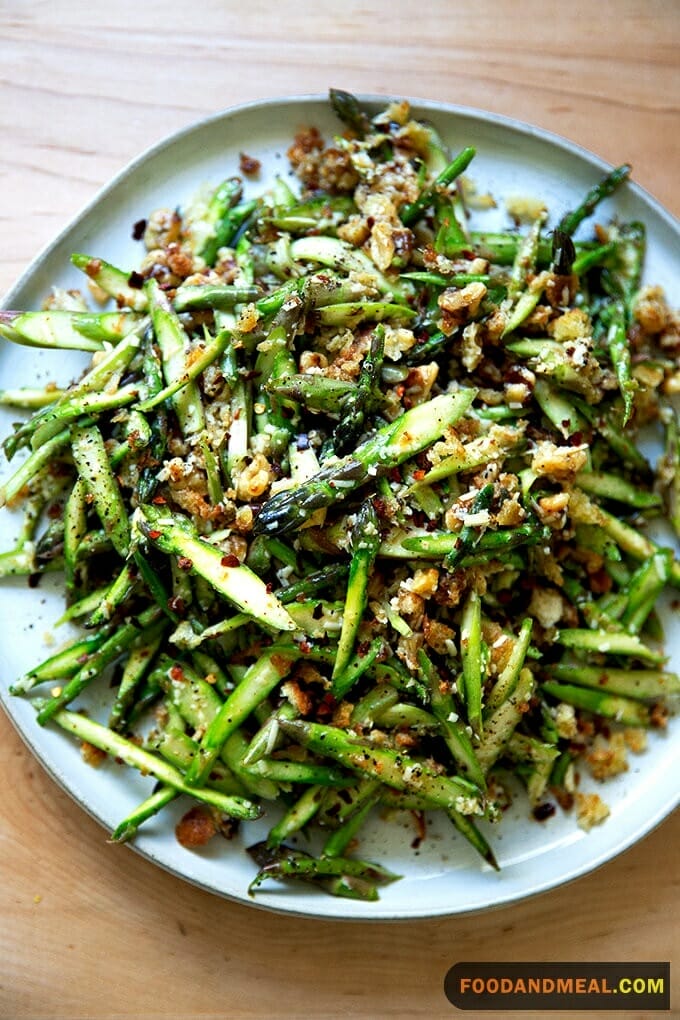
Preheating the grill sets the stage for perfectly cooked asparagus, with its crisp texture and smoky flavor. Once the grill reaches a medium-high heat, the trimmed asparagus spears are tossed in a simple yet flavorful mixture of olive oil, salt, and pepper. Placed directly on the grill grates, the asparagus cooks for just 3 to 5 minutes, turning occasionally until tender and adorned with those coveted grill marks. As they cool slightly, a tangy dressing is prepared, blending balsamic vinegar, extra-virgin olive oil, minced garlic, salt, and pepper for a burst of flavor. Assembling the salad is a delightful affair, with the grilled asparagus taking center stage on a serving platter, adorned with vibrant slices of red bell pepper, red onion, and juicy cherry tomatoes. A generous drizzle of the balsamic vinaigrette adds a touch of acidity and depth. To finish, torn fresh basil leaves and a sprinkling of grated Parmesan cheese elevate the dish, offering a burst of freshness and savory richness. This Grilled Asparagus Salad is a celebration of seasonal produce and simple yet elegant flavors, perfect for any gathering or al fresco dining experience.
Tips for making Asparagus Salad
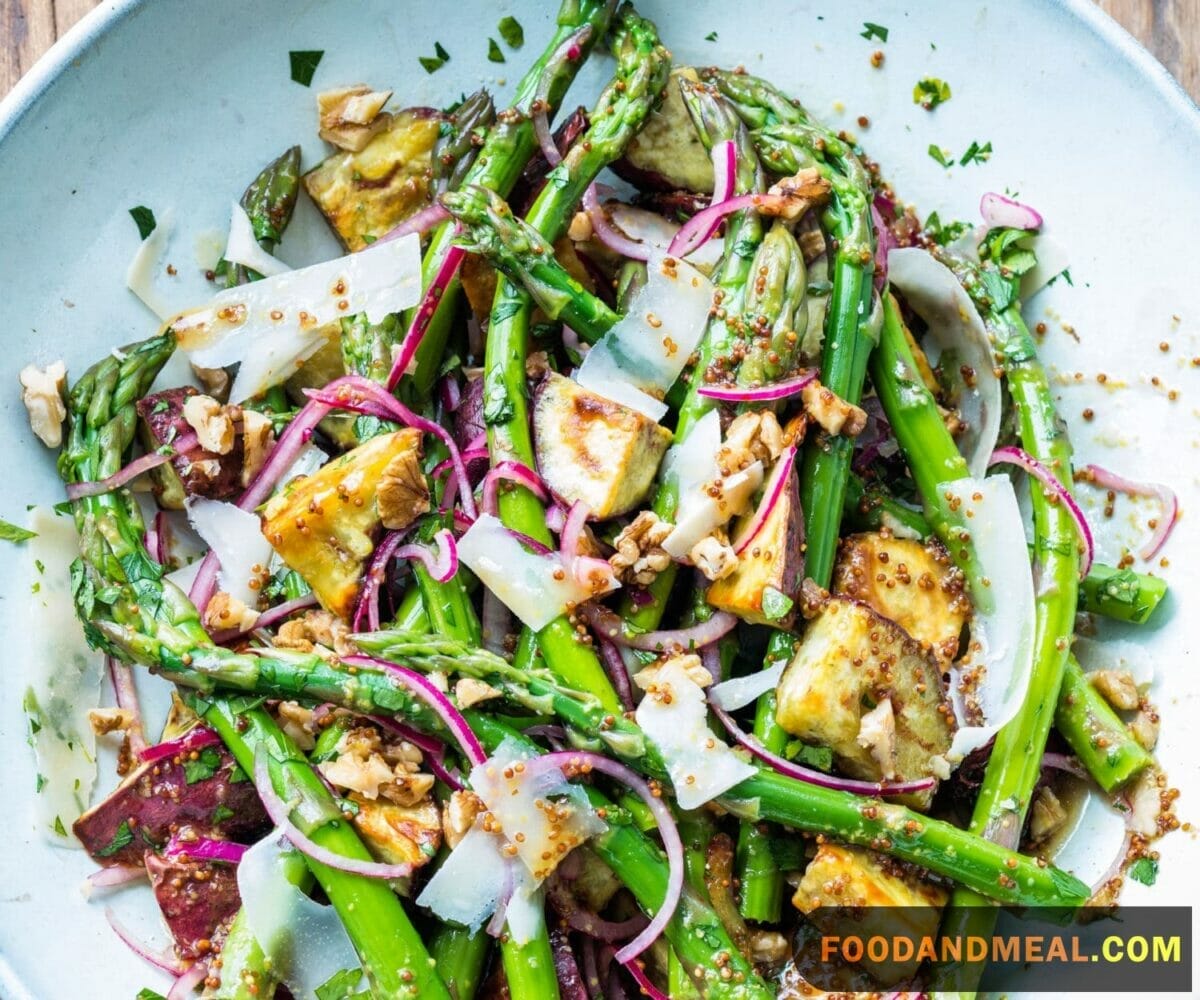
Serving Suggestions
Asparagus Salad is a versatile and flavorful dish that adds a touch of freshness to any meal. Whether you’re enjoying a casual lunch or hosting a dinner party, this salad is sure to impress with its vibrant colors and delicious taste. The crisp-tender asparagus, combined with the sweetness of cherry tomatoes, the crunch of red bell peppers, and the tanginess of balsamic vinaigrette, creates a perfect harmony of flavors. Pair it with grilled halibut for a light and satisfying seafood dinner, or serve it alongside vegetable maki rolls for a healthy sushi feast. For brunch or lunch, enjoy it with a slice of spinach quiche or toss it with pasta primavera for a colorful and nutritious pasta dish. Whether you’re a fan of savory or sweet, there’s a serving suggestion for everyone to enjoy this delightful salad.
Cooking Tips and Tricks
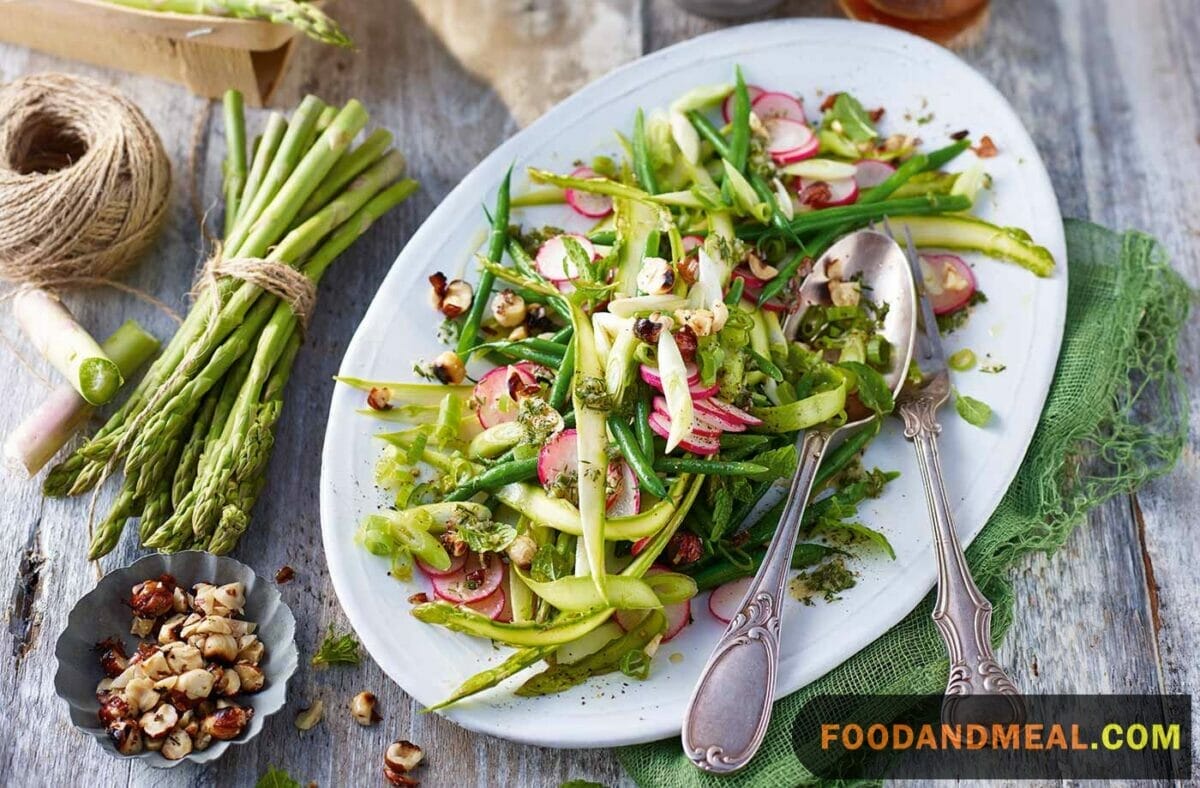
First and foremost, always select fresh, vibrant asparagus spears that are firm to the touch and have tightly closed tips. The freshness of the asparagus will significantly impact the overall flavor and texture of your salad, so it’s worth taking the time to choose the best quality produce available. Additionally, be sure to trim the woody ends of the asparagus before cooking to ensure tender, bite-worthy spears. Embrace creativity when it comes to seasoning and dressing your salad – while a classic balsamic vinaigrette is always a winner, don’t be afraid to experiment with different flavor combinations to suit your taste preferences. Finally, pay attention to cooking times when grilling or blanching the asparagus to achieve the perfect balance of crispness and tenderness. With these tips in mind, you’ll be well on your way to creating a memorable and delicious asparagus salad that will leave your taste buds singing with delight.
Frequently Asked Questions about Asparagus Salad
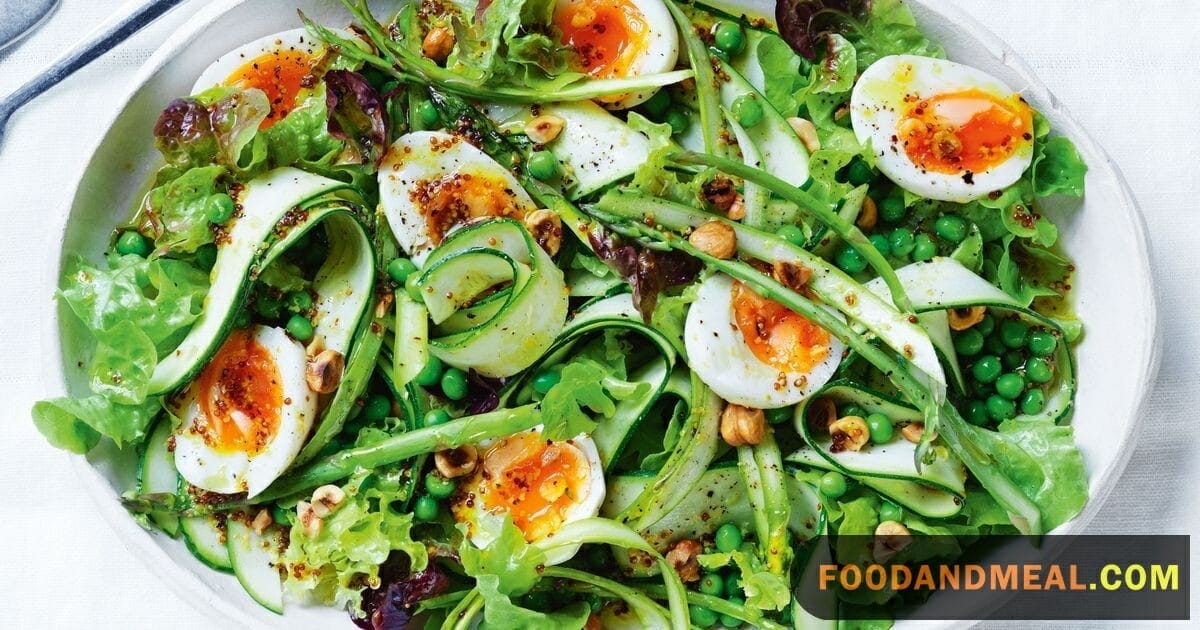
- Can I make this salad ahead of time? Absolutely! Prepare the ingredients separately, store them in the refrigerator, and assemble just before serving.
- What’s the best way to store leftovers? To keep leftovers fresh, store them in an airtight container in the refrigerator for up to two days. Be mindful that the asparagus may lose some of its crispness.
- Can I use other dressings for this salad? Of course! Feel free to experiment with dressings like tahini, yogurt-based, or a simple olive oil and lemon vinaigrette.
- Are there vegan options for this salad? Absolutely. Simply omit any animal-based ingredients like Parmesan cheese and consider using a vegan cheese substitute.
- Can I use different types of asparagus for this recipe? While green asparagus is the most common, you can certainly use white or purple asparagus for a visually striking variation of this salad.
Conclusion
In conclusion, crafting a delightful asparagus salad is not just about following a recipe – it’s about infusing each step with care, creativity, and attention to detail. By selecting the freshest asparagus, trimming it with precision, and experimenting with different seasoning and dressing options, you can transform this simple vegetable into a culinary masterpiece. Whether enjoyed as a light and refreshing side dish or as the star of the meal, a well-prepared asparagus salad has the power to elevate any dining experience. So next time you’re in the kitchen, channel your inner chef, and let your imagination run wild as you create a salad that’s as vibrant and flavorful as it is nutritious and satisfying.
I'm Tracy F Hilton, a devoted culinary professional shaped by a mix of natural aptitude and refined skills from a top culinary school. In the dynamic kitchen environment, I'm a catalyst for seamless operations and timely, high-quality dish preparation. My culinary creations are a blend of art and skill, offering visually and gustatorily delightful experiences. A learner at heart, I'm continuously honing my craft, embracing new techniques, and culinary innovations. My positive, collaborative nature is amplified in fast-paced settings, showcasing my commitment to team efficiency and guest satisfaction. Each dish I present is a meticulous blend of tradition and innovation, promising an unforgettable dining experience that marries taste, aroma, and aesthetic appeal in perfect harmony. Join me on a gastronomic journey where each bite encapsulates a rich, evolving narrative of flavors and culinary artistry.



